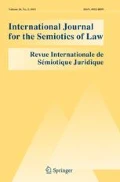Abstract
Yugoslavia existed as a country for several decades. Competing explanatory narratives as to why and how this state ceased to exist—labeled “the self-destruction of Yugoslavia” and “the Hegemon did it”—are contrasted, and connected to two related viewpoints on the question “What role did international law play in the process of dismantling Yugoslavia?”: “reformist optimism” and “traditionalist realism”. It is argued that the former position leads not only to the marginalization of state sovereignty, but also impunitism, genocidalism, humanrightism, and most alarmingly to the decriminalization of aggression. A brief review of essay contributions to this special issue on “Yugoslavia Dismantled and International Law” offers a further argument in favor of traditionalist realism as the preferred postion to take regarding the current state of international relations and international law. In this regard, the case of Yugoslavia is extremely instructive.
Similar content being viewed by others
Author information
Authors and Affiliations
Corresponding author
Rights and permissions
About this article
Cite this article
Jokic, A. Introduction: Yugoslavia Dismantled and International Law. Int J Semiot Law 19, 339–346 (2006). https://doi.org/10.1007/s11196-006-9027-8
Received:
Published:
Issue Date:
DOI: https://doi.org/10.1007/s11196-006-9027-8




